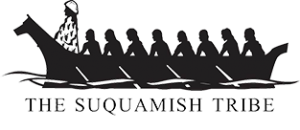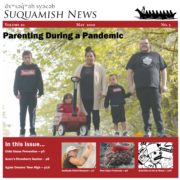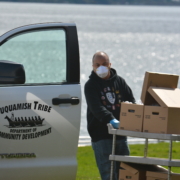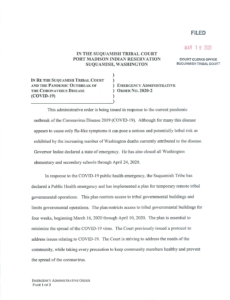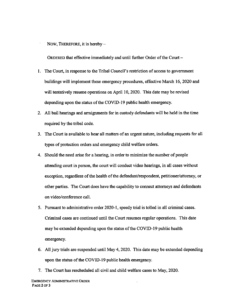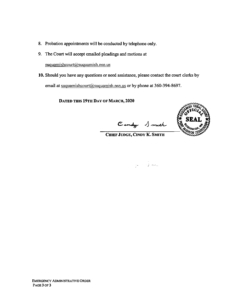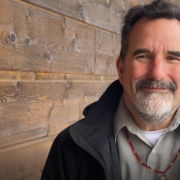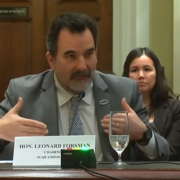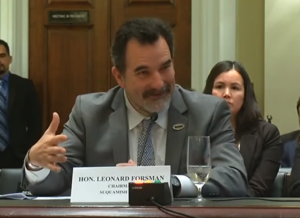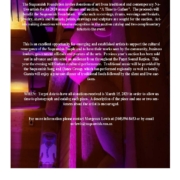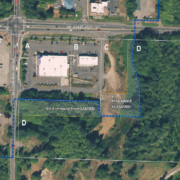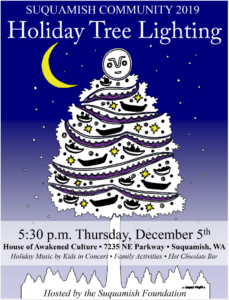Legal victory safeguards Tribe’s Grovers Creek Hatchery
Kitsap County must comply by Dec. 20
By Melody Allen
George’s Corner is a rural crossroads development located 1.5 miles west of Kingston, Washington, at the intersection of Hansville Road and State Route 104 in northern Kitsap County. Under the State of Washington’s Growth Management Act (GMA), George’s Corner is a special land use designation called a “Limited Area of More Intense Rural Development” (LAMIRD). When the GMA was passed in 1990, State legislators recognized the presence of small commercial development pockets that primarily serve the local rural community where there might be a gas station, store and restaurant. The purpose of the GMA LAMIRD requirements and designation is to provide a tool for local governments to legally define the boundaries of pre-existing urban uses before July 1, 1990 that allows those uses to continue within the LAMIRD boundaries while at the same time placing constraints on future urban sprawl outside these designated boundaries into rural lands. The George’s Corner LAMIRD boundaries were established in 2004 and encompass specific portions of each of the four corners at the crossroads.
In 2018, Kitsap County proposed to expand the southeast corner of the George’s Corner LAMIRD that would allow development to encroach closer to critical wetland areas associated with Grovers Creek. George’s Corner is located in the Grovers Creek Watershed and contains a wetland system associated with Grovers Creek that drains to Miller Bay where the Tribe operates the Grovers Creek Hatchery, a Chinook and chum salmon hatchery. Grovers Creek has unique features which make it particularly sensitive to contaminates found in stormwater draining from impervious surfaces.
Impacts to Grovers Creek from increased development, increased traffic, and urbanization directly impact the hatchery as evidenced by poor water quality and low or no water quantity flowing to the hatchery between mid-May to September. During that time, surface water from Grovers Creek is unusable for rearing salmonids due to its poor quality. These impacts, specific to Kitsap County between 2006 and 2011, are well documented in the Suquamish Tribe’s Chapter in The 2016 State of Our Watersheds, A Report by Treaty Tribes in Washington. Impervious surface increases associated with the George’s Corner LAMIRD were identified as impacting stream conditions.
Several years ago, the Tribe joined the National Oceanographic Atmospheric Administration and Washington State University in a study that exposed Grovers Creek Hatchery coho salmon to urban runoff collected from a Highway 520 drain. Every coho exposed to the runoff died. Some died within a few hours, but all died within one day. The surprising results of this study raised awareness of the link between urban stormwater runoff and salmon survival and the need to address stormwater runoff that drains to salmon-bearing waters.
The Fisheries Department and Chairman Leonard Forsman filed comments in opposition to the County’s proposed LAMIRD expansion expressing concerns about increased commercial land use intensity in an area that is in close proximity to Grovers Creek, which is listed as an Endangered Species Act-listed salmon-bearing stream with important habitat, concerns about potential impacts to the Tribe’s Grovers Creek Hatchery, and concerns about impacts to the Tribe’s treaty-reserved resources.
Despite the Tribe’s repeated requests to the County to withdraw the proposed action to expand the LAMIRD, the Kitsap County Board of County Commissioners adopted the County staff’s recommendations and removed a portion of undeveloped land from the southern portion of the LAMIRD and expanded commercial development beyond the original LAMIRD boundary to the east, on lands closest to Grovers Creek that include wetlands and a steep slope. This expansion would allow further commercial activity in close proximity to the steep slope and Grovers Creek that would cause further negative impacts to the water quality of Grovers Creek and the Grovers Creek Hatchery from stormwater runoff draining from impervious surfaces and other environmental impacts.
In February 2019, the Tribe’s Office of Tribal Attorney filed an appeal with the Central Puget Sound Growth Management Hearings Board (Growth Board) challenging the validity of Section 14(3) of Kitsap County Ordinance 565-2018 and its compliance with the GMA LAMIRD provisions and GMA goals designed to protect the environment and water quality and to prevent urban sprawl in rural lands. The Tribe requested the Growth Board to declare that the County’s action was clearly erroneous, failed to comply with the GMA, and requested the Growth Board to issue an order of invalidity, a discretionary enforcement tool available to the Growth Board.
In August 2019, the Growth Board agreed with the Tribe and found that the LAMIRD boundary adjustment failed to comply with the LAMIRD statutory requirements for setting boundaries that are a one-time recognition of existing 1990 areas and uses. The Growth Board also found that the County improperly acted to meet real or perceived needs for additional commercial lands beyond the original 2004 LAMIRD boundaries and failed to contain low-density sprawl by perpetuating a pattern of low-density sprawl that substantially interfered with the GMA goals that are designed to concentrate urban growth in urban areas and protect the environment and enhance the state’s high quality of life. The Growth Board remanded Section 14(3) of Ordinance 565-2018 to the County to take action to comply with the GMA and declared Section 14(3) invalid in its entirety. The Growth Board has set a compliance schedule that requires the County to comply with its Order by December 20, 2019 and file a Compliance Report/Statement of Actions Taken to Comply. The Tribe will continue its legal role in these compliance actions while continuing technical, legal, and policy efforts to protect treaty-reserved rights and critical habitat for the next seven generations.


